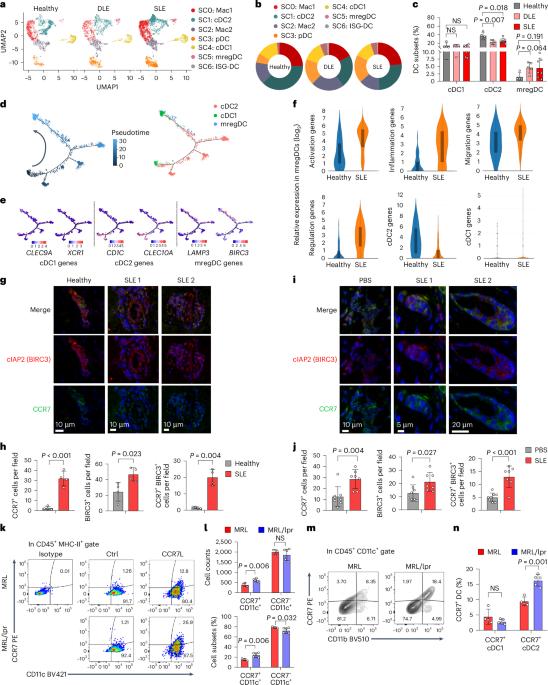Farnesyl pyrophosphate potentiates dendritic cell migration in autoimmunity through mitochondrial remodelling
IF 18.9
1区 医学
Q1 ENDOCRINOLOGY & METABOLISM
引用次数: 0
Abstract
Cellular metabolism modulates dendritic cell (DC) maturation and activation. Migratory dendritic cells (mig-DCs) travelling from the tissues to draining lymph nodes (dLNs) are critical for instructing adaptive immune responses. However, how lipid metabolites influence mig-DCs in autoimmunity remains elusive. Here, we demonstrate that farnesyl pyrophosphate (FPP), an intermediate of the mevalonate pathway, accumulates in mig-DCs derived from mice with systemic lupus erythematosus (SLE). FPP promotes mig-DC survival and germinal centre responses in the dLNs by coordinating protein geranylgeranylation and mitochondrial remodelling. Mechanistically, FPP-dependent RhoA geranylgeranylation promotes mitochondrial fusion and oxidative respiration through mitochondrial RhoA–MFN interaction, which subsequently facilitates the resolution of endoplasmic reticulum stress in mig-DCs. Simvastatin, a chemical inhibitor of the mevalonate pathway, restores mitochondrial function in mig-DCs and ameliorates systemic pathogenesis in SLE mice. Our study reveals a critical role for FPP in dictating mig-DC survival by reprogramming mitochondrial structure and metabolism, providing new insights into the pathogenesis of DC-dependent autoimmune diseases. The mevalonate pathway intermediate farnesyl pyrophosphate is shown to regulate the survival of migratory dendritic cells by affecting their mitochondrial metabolism, thereby contributing to the pathogenesis of systemic lupus erythematosus.


焦磷酸法呢醇酯通过线粒体重塑促进自身免疫中树突状细胞的迁移
细胞代谢可调节树突状细胞(DC)的成熟和活化。从组织到引流淋巴结(dLNs)的迁移树突状细胞(mig-DCs)对于指导适应性免疫反应至关重要。然而,脂质代谢物如何影响自身免疫中的移行树突状细胞仍是个谜。在这里,我们证明了甲羟戊酸途径的中间产物焦磷酸法尼酯(FPP)会在系统性红斑狼疮(SLE)小鼠的mig-DCs中积累。FPP通过协调蛋白的geranylgeranylation和线粒体重塑,促进mig-DC在dLNs中的存活和生殖中心反应。从机理上讲,FPP 依赖的 RhoAeranylgeranylation 可通过线粒体 RhoA-MFN 相互作用促进线粒体融合和氧化呼吸,进而促进 mig-DCs 中内质网应激的解决。辛伐他汀是一种甲羟戊酸通路的化学抑制剂,它能恢复mig-DCs的线粒体功能,并改善系统性红斑狼疮小鼠的全身发病机制。我们的研究揭示了FPP通过重编程线粒体结构和新陈代谢在决定mig-DC存活中的关键作用,为DC依赖性自身免疫性疾病的发病机制提供了新的见解。
本文章由计算机程序翻译,如有差异,请以英文原文为准。
求助全文
约1分钟内获得全文
求助全文
来源期刊

Nature metabolism
ENDOCRINOLOGY & METABOLISM-
CiteScore
27.50
自引率
2.40%
发文量
170
期刊介绍:
Nature Metabolism is a peer-reviewed scientific journal that covers a broad range of topics in metabolism research. It aims to advance the understanding of metabolic and homeostatic processes at a cellular and physiological level. The journal publishes research from various fields, including fundamental cell biology, basic biomedical and translational research, and integrative physiology. It focuses on how cellular metabolism affects cellular function, the physiology and homeostasis of organs and tissues, and the regulation of organismal energy homeostasis. It also investigates the molecular pathophysiology of metabolic diseases such as diabetes and obesity, as well as their treatment. Nature Metabolism follows the standards of other Nature-branded journals, with a dedicated team of professional editors, rigorous peer-review process, high standards of copy-editing and production, swift publication, and editorial independence. The journal has a high impact factor, has a certain influence in the international area, and is deeply concerned and cited by the majority of scholars.
 求助内容:
求助内容: 应助结果提醒方式:
应助结果提醒方式:


